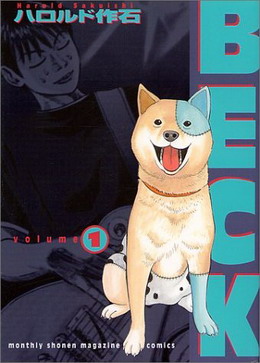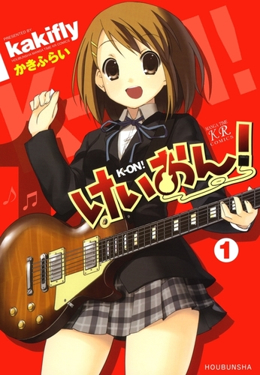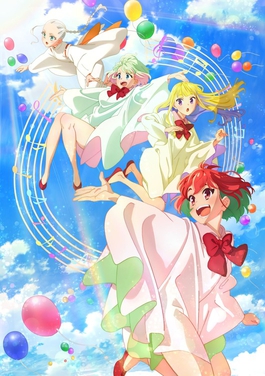
Azumanga Daioh is a Japanese yonkoma comedy manga series written and illustrated by Kiyohiko Azuma. It was serialized from February 1999 to May 2002 in the monthly magazine Dengeki Daioh by MediaWorks; three additional chapters were published in Shogakukan's Monthly Shōnen Sunday in May 2009 to celebrate the manga's tenth anniversary. The manga was first released in English by ADV Manga, and later re-issued by Yen Press.

Bump of Chicken is a Japanese alternative rock group from Sakura, Chiba. The band members are Motoo Fujiwara, Hiroaki Masukawa (guitar), Yoshifumi Naoi (bass) and Hideo Masu (drums). Since their conception in 1994, they have released 27 singles and 10 albums. They are a popular group in Japan; every release since their third single, "Tentai Kansoku", has charted in the top ten on the Oricon Weekly Charts. Their music has been used in various video games and as theme songs for movies, television shows and anime in Japan.

Beck is a Japanese manga series written and illustrated by Harold Sakuishi. It was originally serialized in Monthly Shōnen Magazine from 1999 to 2008, with the 103 chapters later published into 34 tankōbon volumes by Kodansha. It tells the story of a group of Japanese teenagers who form a rock band and their struggle to fame, focusing on 14-year-old Yukio "Koyuki" Tanaka, who until meeting guitar prodigy Ryusuke Minami was an average teen with a boring life.
Penicillin is a Japanese visual kei alternative rock band, formed in Tokyo in 1992.

"Cha-La Head-Cha-La" is a song by Japanese musician and composer Hironobu Kageyama, released as his sixteenth single. It is best known as the first opening theme song of the Dragon Ball Z anime television series. Columbia released the single on vinyl, cassette and mini CD on May 1, 1989. It is coupled with the first Dragon Ball Z closing theme, "Detekoi Tobikiri Zenkai Power!" performed by Manna.

Nightmare is a Japanese visual kei rock band formed in Sendai, Tōhoku, in 2000. It has consisted of Yomi, Sakito, Hitsugi, Ni~ya and Ruka for the majority of their existence. They experienced mainstream success with the inclusion of their songs "The World" and "Alumina" in the Death Note anime and are considered a major act in the visual kei scene.

Lucifer was a Japanese visual kei rock band, best known for contributing several of their songs to the popular anime, Kaikan Phrase. The band was formed in 1999, and disbanded in early 2003. They officially debuted on 15 September 1999 with their big hit single Datenshi BLUE, and became increasingly popular thereafter.
Beat Crusaders were a Japanese rock band active from 1997 to 2010. During all promotional appearances, their faces are masked by drawings resembling themselves as printed by a dot-matrix printer.

Captain is a baseball manga series by Akio Chiba which ran in Monthly Shōnen Jump from 1972 to 1979. This series ran concurrently with another Chiba manga series Play Ball, which ran in Weekly Shōnen Jump from 1973 to 1978. Captain, along with Play Ball, won the 22nd Shogakukan Manga Award for shōnen in 1977.

Maximum the Hormone is a Japanese heavy metal/hardcore punk band from Hachiōji, Tokyo. Their lineup consists of vocalist Daisuke-han, drummer Nao, guitarist Maximum the Ryokun, and bassist Ue-chang. Each member alternates singing lead vocals, often within the same song, with the exception of Ue-chang, who provides backup vocals almost exclusively.

My-HiME is a Japanese manga series based on a Sunrise's My-HiME series, it is following a storyline different from that of the anime. It is authored by Hajime Yatate, Noboru Kimura (scenario), and Kenetsu Satō (art). It was published for 44 chapters in Akita Shoten's shōnen manga magazine Weekly Shōnen Champion from 2004 to 2005. It was licensed for English released in North America by Tokyopop.
Noboru Kawasaki is a Japanese manga artist. He is best known for illustrating the series Star of the Giants. He won the 14th Shogakukan Manga Award in 1969 for Animal 1 and Inakappe Taishō as well as the eighth Kodansha Children's Manga Award for Star of the Giants in 1967 and its successor Kodansha Manga Award in the shōnen category for Football Hawk in 1978. He is also the creator of The Song of Tentomushi, Skyers 5, and Kōya no Shōnen Isamu.
DOES is a three-piece Japanese rock band. DOES was formed in 2000 in the Fukuoka prefecture, where they continued to write songs and perform gigs until 2005. In 2005, some members left and the group went on hiatus. Releasing songs since 2004, DOES signed with Ki/oon Records in 2006. In 2008, their 6th single “Donten” reached 3rd on the Oricon weekly music ranking charts. It was also the 5th opening for the anime Gintama.

Detroit Metal City is a Japanese manga series written and illustrated by Kiminori Wakasugi. It was serialized in Hakusensha's seinen manga magazine Young Animal from September 2005 to April 2010, with its chapters collected in ten tankōbon volumes. The manga was licensed for English release in North America by Viz Media. The series takes its name from the song "Detroit Rock City" by the American band Kiss.

K-On! is a Japanese four-panel manga series written and illustrated by Kakifly. It was serialized in Houbunsha's Manga Time Kirara magazine between the May 2007 and October 2010 issues, and also serialized in Houbunsha's Manga Time Kirara Carat magazine. The manga relaunched from April 2011 to June 2012 with two separate storylines published in Manga Time Kirara and Manga Time Kirara Carat. The manga is licensed in North America by Yen Press. A spin-off manga about a different band of high school girls, K-On! Shuffle, began serialization in July 2018. The main series focuses on four young Japanese high school girls who join their school's light music club to try to save it from being abolished. However, they are the only four members of the club, one of which has little experience with guitar playing.

"Pegasus Fantasy" is a song by Japanese metal band Make-Up. Serving as the band's fourth major release single, "Pegasus Fantasy" and its B-side "Blue Forever" were used as the theme songs for the first half of the original Saint Seiya anime. "Pegasus Fantasy" became Make-Up's most successful release, and they have re-released the song several times since its initial release in 1986. After releasing a "21st century ver." on their mini-album The Voice from Yesterday, Make-Up released a new edition of the song in 2012, subtitled "Version Omega", which features Shoko Nakagawa, the voice actress for Athena, on guest vocals and is used as the opening theme song for the re-imagined Saint Seiya Omega anime. "Pegasus Fantasy Version Omega" reached number 29 on the Oricon's weekly rankings. Masami Kurumada, the author of the Saint Seiya manga, has even included "Pegasus Fantasy" in the manga, with a background character seen singing it. It was appereanced in Taiko no Tatsujin: Drum 'n' Fun!.

Carole & Tuesday is an original anime television series directed by Shinichirō Watanabe. It was produced by Bones in commemoration of the studio's 20th anniversary and the 10th anniversary of record label FlyingDog. It aired from April 11 to October 3, 2019, on Fuji TV's +Ultra programming block. A manga adaptation by Morito Yamataka began serialization in Young Ace in May 2019 and ended in July 2020. The manga is licensed in English by Yen Press. An English dub premiered worldwide on Netflix on August 30, 2019.

Hypertoughness is the sixth studio album by Japanese electronicore band Fear, and Loathing in Las Vegas. It was released on 4 December 2019 through Warner Music Japan. It is the first album to feature new bassist Tetsuya, who replaced Kei due to the latter's death from acute heart failure at his home on the night of January 12th earlier that year.

Healer Girl is an original Japanese anime television series animated by studio 3Hz. The series is directed by Yasuhiro Irie, written by Noboru Kimura, and features character designs by Yukie Akiya, and music composed by Ryo Takahashi. It features singer voice actress choir unit Healer Girls, composed of the four main cast members. The series aired from April to June 2022.













